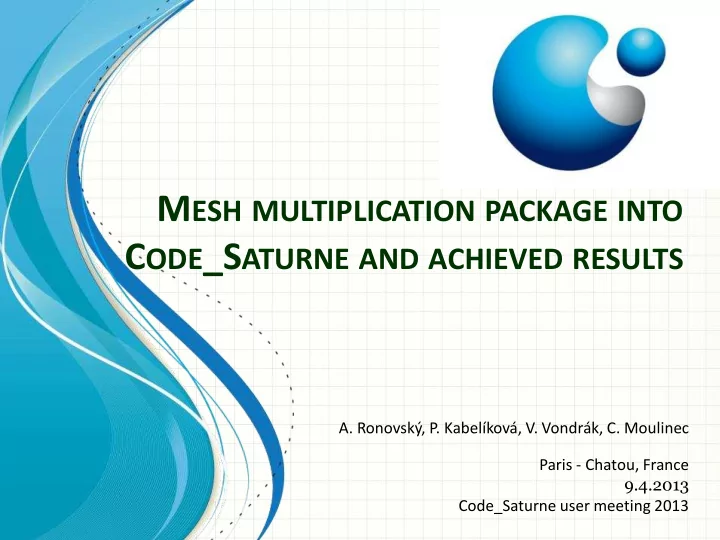

M ESH MULTIPLICATION PACKAGE INTO C ODE _S ATURNE AND ACHIEVED RESULTS A. Ronovský, P. Kabelíková, V. Vondrák, C. Moulinec Paris - Chatou, France 9.4.2013 Code_Saturne user meeting 2013
Contents • Motivation • Preprocessing • Mesh Multiplication • Results • Perspectives
How to achieve exascale … -> Peta -> Exa • PRACE, EDF + STFC + IT4I • Real complex problem • Fully defined • Test case: LES in staggered distributed tube bundles • Architecture • Solver -> Code_Saturne • Large mesh (3D) – mesh generators? • Post-processing • Visualization
Mesh Multiplication - Overview – Working with mesh of Billion cells – Create or load such a mesh is very expensive – Global refinement – Existing coarse mesh suitable for CFD simulations, changing size by subdivision of each cell – Creating very fine mesh, much lesser time of loading and partitioning – higher accuracy of the solution is attained – 13 million cell mesh to 6.6 Billion – 10 time steps – 51 million cell mesh to 26 Billion – 1 time step – Code_Saturne is able to solve that large problem
Mesh Multiplication - Connectivity • Several methods of subdivision • Different behaviour of refinement for hexahedra, tetrahedra, prism or pyramid cells • Edge midpoints subdivision • Global connectivity ensured • Cheap way of indices computation • No unnecessary core-to-core communication • Reasonable times of refinement due to the time of whole simulation • Lot of computational time saved = lot of resources saved for solver
MM and cs_solver.c • Initialization (global structures) • Define mesh to read • Define joining and periodicity • Set partitioning options • Read preprocessor output • Mesh Multiplication • Mesh joining • Initialize extended connectivity, ghost cells, halo • Other mesh modifications (geometry, smoothing) • Save mesh and discard all temporary structures • Renumbering of a mesh, group classes, quantities, … • Main computation • …
Mesh Multiplication - Algorithm • Input: coarse mesh • Pre-processing: – Create edge local/global numbering, – Create faces to edge connectivity, – Define cells. • Refinement: – Create new vertices on edges, on border and interior rectangular faces, – Refine all faces that inherit family and group from parent. • Cell refinement: Preparation: – Create new vertex in the centre of gravity of the hexahedral cell, – Order faces of the cell to ensure positiveness of normal vectors, – Prepare indices of vertices. Cell subdivision: – Refine the cell, – Create new interior faces, – Assign proper face to cell connectivity to each new face and cell. • Output: refined mesh.
Mesh Multiplication - Indexation • Vertices – From coarse mesh keep indices – Edge vertex: n_vertices + edge_idx – Rectangular face vertex: n_vertices + n_edges + face_idx – Hexa cell vertex: n_vertices + n_edges + n_faces + cell_idx • Faces – Every face refined into 4 – Refined face: 4*(face_idx - 1) + 1:4 – New face (cell subdivision): 4*n_faces + T*(cell_idx-1) + 1:T – T – depends on mesh (12 for hexa , tetra, 10 for prism,…) • Cells – New cell: T*(cell_idx-1) + 1:T – T – depends on mesh (8 for hexa, tetra, prism, …)
Results • Different architectures • Different cases • Mesh of 51 million cells • Refined to 26 Billion on 65k cores • 1 time step C_S – 12288 MPI + 8 OpenMP = ~500s
Scalability 25 Scalability 1,6B (26M-2levels) 20 3,3B(51M-2levels) • Good scalability up time to refine (sec) 6.6B(13M-3levels) 15 to 65k cores 13B(26M-3levels) • MM takes just a 26B(51M-3levels) 10 fraction of time due 5 to whole 0 0 10000 20000 30000 40000 50000 60000 70000 computation number of cores • MM of coarser mesh is much cheaper then creating and loading fine mesh
Perspectives • cs_user_mesh – Pyramids and prisms – hybrid meshes – Option of mesh multiplication for every C_S user (0-default) • Adaptive refinement – Global refinement adaptive to geometry – Local refinement based on a priori (geometry,…) and a posteriori (gradient, error, …) estimates – Remeshing, demeshing – Floating parts of a mesh, changing size, shape • Polyhedral meshes – Global/ adaptive refinement of general polyhedral mesh
T HANK YOU
Recommend
More recommend